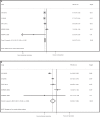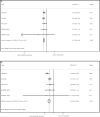Effect of flexible sigmoidoscopy-based screening on incidence and mortality of colorectal cancer: a systematic review and meta-analysis of randomized controlled trials
- PMID: 23226108
- PMCID: PMC3514315
- DOI: 10.1371/journal.pmed.1001352
Effect of flexible sigmoidoscopy-based screening on incidence and mortality of colorectal cancer: a systematic review and meta-analysis of randomized controlled trials
Abstract
Background: Randomized controlled trials (RCTs) have yielded varying estimates of the benefit of flexible sigmoidoscopy (FS) screening for colorectal cancer (CRC). Our objective was to more precisely estimate the effect of FS-based screening on the incidence and mortality of CRC by performing a meta-analysis of published RCTs.
Methods and findings: Medline and Embase databases were searched for eligible articles published between 1966 and 28 May 2012. After screening 3,319 citations and 29 potentially relevant articles, two reviewers identified five RCTs evaluating the effect of FS screening on the incidence and mortality of CRC. The reviewers independently extracted relevant data; discrepancies were resolved by consensus. The quality of included studies was assessed using criteria set out by the Evidence-Based Gastroenterology Steering Group. Random effects meta-analysis was performed. The five RCTs meeting eligibility criteria were determined to be of high methodologic quality and enrolled 416,159 total subjects. Four European studies compared FS to no screening and one study from the United States compared FS to usual care. By intention to treat analysis, FS-based screening was associated with an 18% relative risk reduction in the incidence of CRC (0.82, 95% CI 0.73-0.91, p<0.001, number needed to screen [NNS] to prevent one case of CRC = 361), a 33% reduction in the incidence of left-sided CRC (RR 0.67, 95% CI 0.59-0.76, p<0.001, NNS = 332), and a 28% reduction in the mortality of CRC (relative risk [RR] 0.72, 95% CI 0.65-0.80, p<0.001, NNS = 850). The efficacy estimate, the amount of benefit for those who actually adhered to the recommended treatment, suggested that FS screening reduced CRC incidence by 32% (p<0.001), and CRC-related mortality by 50% (p<0.001). Limitations of this meta-analysis include heterogeneity in the design of the included trials, absence of studies from Africa, Asia, or South America, and lack of studies comparing FS with colonoscopy or stool-based testing.
Conclusions: This meta-analysis of randomized controlled trials demonstrates that FS-based screening significantly reduces the incidence and mortality of colorectal cancer in average-risk patients.
Conflict of interest statement
The authors have declared that no competing interests exist.
Figures



References
-
- Jemal A, Siegel R, Xu J, Ward E (2010) Cancer statistics, 2010. CA Cancer J Clin 60: 277–300. - PubMed
-
- Bandi P, Cokkinides V, Smith RA, Jemal A (2012) Trends in colorectal cancer screening with home-based fecal occult blood tests in adults ages 50 to 64 years, 2000–2008. Cancer 118: 5092–5099. - PubMed
-
- Seeff LC, Richards TB, Shapiro JA, Nadel MR, Manninen DL, et al. (2004) How many endoscopies are performed for colorectal cancer screening? Results from CDC's survey of endoscopic capacity. Gastroenterology 127: 1670–1677. - PubMed
-
- Screening for colorectal cancer (2008) U.S. Preventive Services Task Force recommendation statement. Ann Intern Med 149: 627–637. - PubMed
-
- Levin B, Lieberman DA, McFarland B, Andrews KS, Brooks D, et al. (2008) Screening and surveillance for the early detection of colorectal cancer and adenomatous polyps, 2008: a joint guideline from the American Cancer Society, the US Multi-Society Task Force on Colorectal Cancer, and the American College of Radiology. Gastroenterology 134: 1570–1595. - PubMed
Publication types
MeSH terms
Grants and funding
LinkOut - more resources
Full Text Sources
Other Literature Sources
Medical

